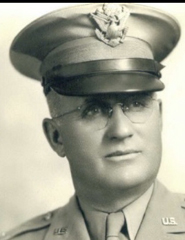LEMKE NOTED LONE FIGHTER
Goes Out at Night, Shoots Down Nazis
By FRANK MILES
(Iowa Daily Press War Correspondent)
With the 5th Army in Italy (IDPA) -- Pvt. Edwin Lemke, a slender, soft speaking, 25 year old Webster City farm youth, is the"Sergeant York" of the 5th army. The Stars and Stripes has carried a story of his exploits in the 34th division with his picture under a 3-column, 2 deck head.
Lemke has been awarded the distinguished service cross for rescuing a trapped squad by crawling through a drainage ditch, wiping out a 5-man patrol and leading his American comrades to safety.
Buddies tell amusing tales of Lemke's valor and skill as a solder, especially on lone rallies but he is mum like a clam.
"He'll talk about hunting back in Iowa, how he had always wanted to fly or why he prefers the carbine to the M-1, about his one-man forays into the enemy lines at night—the guy just ain’t sayin’.
Not even the GI’s in his company know for sure how many Germans Lemke has killed. All they know is that two or three times a week since the Anzio beachhead, Lemke spent the day sizing up the sector in front of his company. He studied the roads and trails through his glasses, likely German dugout sites and troop concentrations plus the best routes of approach. Then, after dark, he took his favorite weapons, the German Luger and GI carbine, all the ammunition he could carry and disappeared.
It’s OK with his CO—Lemke has been given a free hand. Then the next morning it’s “I got three in a dugout, or four in that house down the road,” but no more.
Lemke is a legend in his company. Most doughboys, no matter how courageous have their belly-full of fighting just doing what they are supposed to do. A guy who goes out by himself to hunt Germans when the rest of the men are sleeping or taking a break in their foxholes is a guy not easy to understand.
At first when Lemke wouldn’t talk about what he did on those lone expeditions except mention the fact that he killed three here or six there, the guys figured that maybe they had a screwball on their hands.
"But when the company advanced and the men saw German bodies in the exact places described to them, they were sold."
Lemke came overseas with his outfit in February of 1942. He owned his first gun at 12 and hunted birds with a .22 rifle, figuring that a shotgun or dog would take the sport out of stalking.
The cunning and patience he learned then are the traits which enable him to cut an enemy communication line then hide in the bushes until somebody comes along to fix the break but now it’s a Luger instead of a .22 and Nazi soldiers instead of Iowa wildlife, Fleisher adds.
And those lessons in patience made it possible for him to lie in waiting outside a German tent for more than two hours until the officer and four aides, laden with maps and other papers, walked inside. Then the Luger again and a good haul of valuable documents to boot.
Some of his friends say his love of hunting impels him to fight the Germans as he does, others that he broods over German atrocities, according to the article.
"But to the casual visitor, Lemke's 'naming' anything is very unlikely. He is friendly enough, with a quick, fleeting grin and cold blue yes which don't focus on anything more than a moment. He will answer any questions except those pertaining to his fighting. He says he doesn't remember much about his individual experiences and to the questions "How many Krauts have you killed?" he'll just laugh and shake his head."
Lemke's greatest, single exploit, his comrades say, was breaking up an enemy tank attack before it materialized near Cecina. He hid himself on the edge of town, spotted a concentration of Tiger tanks and killed so many tankmen with his rifle survivors fled.
A powerfully built, dynamic young captain, whose blue eyes flash and square jaw click when he speaks of battle and who led a company mostly of Iowans through many campaigns confided to me that he wept whenever one of his boys was killed or wounded.
"I cry and curse the fates that made war when I am alone after I see my lads go down," he said. "Sometimes I think that all we might get out of victory wouldn't be worth one of the precious lives I've seen blacked out, but I push on because I am determined to do my duty or die trying."
The captain's men say he is "our fighten'est soldier."
Source: Mason City Globe-Gazette, January 3, 1945
![]()

